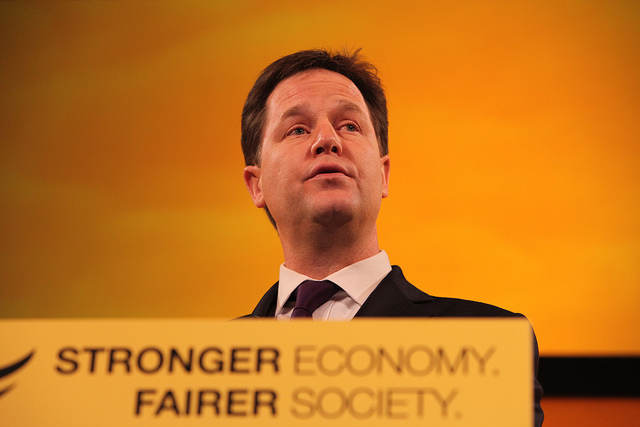As the first week of campaigning draws to an end, leader of the Liberal Democrats Nick Clegg has revealed he would not want to form a multiparty government…
A rainbow coalition would be a “recipe for insomnia”, said Nick Clegg, the leader of the Liberal Democrats.
Current polls suggest a coalition of two parties would be unlikely to secure a majority in the Common, but Clegg said his party would be unlikely to join a coalition made up of numerous political groups.
The Lib Dems have already limited their choices by stating they would be unwilling to form a coalition with the Scottish National Party. Incidentally, the Labour party, who were rumoured to be thinking of a coalition with the SNP, also confirmed this course of action would not be one for them either.
Clegg pointed to the last election in 2010, during which the former Labour leader Gordon Brown “was very adamant that he thought one could create a rainbow coalition – a smorgasbord of lots of different parties”.
He continued: “I remember saying I did not think that was ever going to work and I still don’t think that is ever going to work, and by the way that might be a more relevant question after 7 May.
“I think this idea that you have a government with a whole array of single issue parties all pulling this way or that is a recipe for insomnia after votes are strung out night after night in the House of Commons, but it is also a recipe for a messy way of governing the country”.
Clegg said as a representative of the Liberal Democrats he would speak first to the party with the most votes in the Commons, which according to current predictions would be the Conservatives. However, few election forecasts place the Conservatives and Liberal Democrats on the same team.
He also warned that multiparty coalitions were “a jumble sale of single issue parties all haggling with one another day and night”.
“What is different about this election, and it will loom large in tonight’s debate, is that people are increasingly acknowledging in this election that no one is going to win outright this time.
“In a sense, you have to choose which party you prefer but also which parties would you prefer working together after 7 May.
“I think Liberal Democrats in government is a good thing because we keep the two largest parties on the centre ground rather than lurching to the left or the right.”
When asked what party he would prefer to work with Clegg side-stepped by stating he was a democrat and would follow the instructions of the British people.
“My whims, wishes, feelings, likes or dislikes about this or that party leader are literally completely irrelevant.
“The only thing that is relevant is the cards that are dealt to us by this wonderful millions and millions of people putting a cross in the ballot box.
“They will tell us what form of combination is possible. Last time the only combination that arithmetically yielded a government [that] could govern was one between Liberal Democrats and Conservatives. It may be different next time.”
Undoubtedly a multiparty coalition would be the worst outcome of voting, but given the likelihood of a majority winner it feels as if the Lib Dems are shooting themselves in the foot by refusing to play nicely with the other players—particularly given there are still weeks to go before the outcome of the election will be known.











